ANGEL INVESTING IN TECH STARTUPS WITH RAPHAEL KONTOS | E020 PODCAST
LISTEN TO THIS EPISODE ON ALL STREAMING SERVICES
ABOUT THE GUEST
Raphael Kontos sits down with George Stroumboulis in Athens (Kolonaki Square), Greece on the Invigorate Your Business Podcast to talk about all things angel investing, tech startups and Greek business.
Raphael Kontos is the Founder and Managing Director of The Hellenic Tech Investor Club (THETI Club for short) based in Athens, Greece. Raphael has built Greece’s first tech investment club for the Greek investment community – bringing capital to aspiring startups looking to create tech-driven business in the country.
Raphael is originally from Mykonos, born and raised on the island and exposed to tourism from around the world from a young age. Driven to stay in Greece and create a platform for the tech community, Raphael has developed an investment club with key business professionals from all facets of the business community.
Raphael’s club has already invested in several startups in Greece. A graduate of the University of Piraeus, Raphael is driven to remain in Greece and build this platform.
Website: https://theticlub.gr/
Raphael’s LinkedIn: https://www.linkedin.com/in/raphael-kontos-847a32b6/
THETI Club LinkedIn: https://www.linkedin.com/company/theti-club-the-hellenic-tech-investor-club/
“We are one of the most entrepreneurial nations in history. Yeah. We’re the first to cross the Indian Ocean, like crazy stuff. Okay. Trade. We follow the globe.”
MEDIA RELATED TO THE EPISODE
Raphael Kontos sits down with George Stroumboulis in Athens, Greece on the Invigorate Your Business Podcast to talk about all things angel investing, tech startups and Greek business.
Raphael Kontos sits down with George Stroumboulis in Athens, Greece on the Invigorate Your Business Podcast to talk about all things angel investing, tech startups and Greek business.
Raphael Kontos sits down with George Stroumboulis in Athens, Greece on the Invigorate Your Business Podcast to talk about all things angel investing, tech startups and Greek business.
Raphael Kontos sits down with George Stroumboulis in Athens, Greece on the Invigorate Your Business Podcast to talk about all things angel investing, tech startups and Greek business.
ABOUT THE “INVIGORATE YOUR BUSINESS” PODCAST
The Invigorate Your Business with George Stroumboulis podcast features casual conversations and personal interviews with business leaders in their respective fields of expertise. Crossing several industry types and personal backgrounds, George sits down with inspiring people to discuss their business, how they got into that business, their path to the top of their game and the trials and tribulations experienced along the way. We want you to get inspired, motivated, and then apply any advice to your personal and professional lives. If there is at least one piece of advice that resonates with you after listening, then this podcast is a success. New episodes weekly. Stream our show on Spotify, YouTube, Apple, Amazon and all other platforms.
ABOUT GEORGE STROUMBOULIS
George Stroumboulis is an entrepreneur to the core, having launched several ventures across multiple industries and international markets. He has held senior-level positions at progressive companies and government institutions, both domestically and internationally, building an extensive portfolio of business know-how over the years and driving profit-generating results. George’s ability to drive real change has landed him in several media outlets, including the front page of the Wall Street Journal. George was born in Toronto, Canada to his Greek immigrant parents. Family first. Flying over 300,000 miles a year around the world puts into perspective how important family is to George’s mental and emotional development. With all this travel to global destinations, the longest he stays even in the most far-out destination is 3 days or less - a personal rule he lives by to make sure he is present and involved in family life with his wife and three daughters. To read about George’s global travels, stay connected with his blog section.
STAY CONNECTED WITH GEORGE STROUMBOULIS
STREAM & LISTEN TO THE PODCAST:
SPOTIFY: https://open.spotify.com/show/1rW2CmxQoiJNEPOZupJlvd
YOUTUBE: https://www.youtube.com/user/Stroumboulis
APPLE iTUNES: https://podcasts.apple.com/us/podcast/invigorate-your-business-with-george-stroumboulis/id1607693240
AMAZON MUSIC: https://music.amazon.com/podcasts/8fc03929-71b3-483a-a64e-153e30b3d462/invigorate-your-business-with-george-stroumboulis
iHEARTRADIO: https://www.iheart.com/podcast/269-invigorate-your-business-w-92187370/
STROUMBOULIS SITE: https://www.stroumboulis.com/podcast
PODCAST SITE: http://www.invigorateyourbusiness.com
OTHER SERVICES: GOOGLE, PANDORA, OVERCAST, CASTRO, CASTBOX, PODFRIEND, PLAYER.FM, PODCASTADDICT, PODCHASER, PODCASTINDEX and RSS FEED.
FOLLOW GEORGE STROUMBOULIS:
INSTAGRAM: https://www.instagram.com/georgestroumboulis/
YOUTUBE: https://www.youtube.com/user/Stroumboulis
LINKEDIN: https://www.linkedin.com/in/Stroumboulis/
TWITTER: https://twitter.com/Stroumboulis
FACEBOOK: https://www.facebook.com/georgestroumboulis
TIKTOK: https://www.tiktok.com/@georgestroumboulis
CONTACT GEORGE DIRECTLY: https://www.stroumboulis.com/connect
FULL SHOW TRANSCRIPT
George Stroumboulis: Today I sit down with Raphael Kontos. He is the founder and managing director of The Hellenic Tech Investor Club here in Athens, Greece. He's changing the game for young entrepreneurs in the tech industry, seeking investment from successful business people. Enjoy this episode of Invigorate Your Business with George Stroumboulis. Starting now.
My name is George Stroumboulis and I'm extremely passionate about traveling the world, meeting new people, and learning about new businesses. Join me as I sit down with other entrepreneurs to learn about their journeys. This episode of Invigorate Your Business starts now.
George Stroumboulis: So we are here today. We're in beautiful Athens. Very excited to be here. We're in the suburb of Kolonaki. Right? Which I absolutely love. It's close to everything. And we're sitting here with Raphael Kontos.
Raphael Kontos: My name is Raphael Kontos. I'm the founder and the director of the Hellenic Tech Investor Club. The Theti Club for short. Theti Club is the first Tech Angel group in Greece, focusing exclusively on early stage ventures, tech ventures. And we have started the last six, seven months and everything is going very well. We're going have a discussion with my friend George.
George Stroumboulis: Absolutely. Thank you. Thank you for joining. So how did we actually connect through, through LinkedIn, through social, right? We ended up connecting…
Raphael Kontos: Exactly. Until a few hours ago we didn't know each other, but now we are good friends, we have the same passion for businesses and entrepreneurship. We both have the same vision to improve our country, to improve Greece. Greece and you work together to make fantastic things.
George Stroumboulis: Yeah. So we're going to dive into a bunch of things. So first things first, you're 27 years old. And you started basically Greece's first tech investment club. Right? So you're not even in your thirties and in the last year or two years have brought together so many wealthy, high profile, highly motivated entrepreneurial people in Greece for the Greek market.
Raphael Kontos: It's very hard.
George Stroumboulis: It's very hard. So just that alone to have the balls to want to do that, be able to do that, and starting it regardless of where it is or where it's going. [Inaudible 2:28 – 2:29]. Congrats.
Raphael Kontos: Thank you very much.
George Stroumboulis: That's a big, big deal. Very impressive.
Raphael Kontos: And it wasn't easy because I'm not from Athens, or I wasn't connected. So this kind of, in order to put an investment club, you need to have the connections. But at the same time, you have the enough to be and you are bold. You can do miracle.
George Stroumboulis: Absolutely. So let's start into this. A few years ago, you launched this club, right? Rewind. Where are you from in Greece?
Raphael Kontos: Actually, I launched it a few months ago, eight, nine months ago. I am from Mykonos. I grew up in the well-known island of Mykonos.
George Stroumboulis: So born and raised in Mykonos.
Raphael Kontos: In the party island. Yes.
George Stroumboulis: Yeah.
Raphael Kontos: I was… Okay. Everybody refer Mykonos as a party island, but since then you are there the winter, it's very calm and like it’s a [inaudible 03:21]. So you don't feel like when you're kid that you're in Mykonos, you don't understand that. But slowly you can understand a few things. And see, the thing with Mykonos is that although it's very local place, let's say it's a very small place, at the same time we receive 2 million visitors. So you are going to get exposed to different people and ideas. It’s not just a European destination, it's an international destination. Have Americans, who have Australians, who have from South Africa, from all over the world.
George Stroumboulis: A lot of Middle Eastern countries now coming there as well.
Raphael Kontos: There is a lot in Middle Eastern.
George Stroumboulis: So there's only 8,000 or so full-time residents in Mykonos, all year round. So you pretty much know everyone, you know of everyone's family. My uncle, so my dad's cousin actually left from Evia to Mykonos 40 plus years ago. So I have Stroumboulis name there too. And we have some cousins. And it's another world, right? So when you go to there to party, let's talk about some of the crazy stuff growing up there. What type of business were you involved with or your family living in the church?
Raphael Kontos: Probably the funny part with [inaudible 04:26] is that whatever you do, you either you want it or don't want it, you're going to work in tourism. Directly or indirectly, let me say, my father is a doctor. He's a dentist. He’s a well-known dentist in Mykonos, but at the same time, 70% of his customers are tourists. So he serves the tourism industry.
George Stroumboulis: As a dentist.
Raphael Kontos: As a dentist, whatever you do, they're going to serve the tourism industry, right?
George Stroumboulis: Absolutely. I'm so curious.
Raphael Kontos: I was 18 years old, the next day I went to work, the next day I became 18 years old. And then my first job was in a gas station, helping gas station. The majority of the customers are tourists. This is the norm for almost about indirectly you work in tourist.
George Stroumboulis: So let me ask you being a dentist in Mykonos for the tourist, what's the most common problem? Like bottle smash teeth? Like what?
Raphael Kontos: From falling down during the pool, right?
George Stroumboulis: Smashing something.
Raphael Kontos: Smashing the jaw. You have to run and fix everything.
George Stroumboulis: Well, let me ask you. So we always, when we travel there versus other islands, it's like a, I don't know if it's a stigma, but a lot of the locals think the tourists are crazy there, right? Because you guys get a lot of, people are like Mykonos, it's on the same level as Ibiza or Las Vegas. So people go there, majority of just to get shit faced drunk. Cause a ruckus. How do the locals respond to that?
Raphael Kontos: That is true. Exactly. The locals think sometimes that some of the tourists, they're crazy. So what we try to do in Mykonos is like focusing on the most high end, let's say not so party guys, let's say. Like more quality. Because you have sometimes your worst customers, some the ones who make all the noise and the problems. They create all the problems. It is not easy at the same time in Mykonos. Okay, the locals, I do think that the success of Mykonos is that because the local already flyingly very open. At the same time, you have now a lot of new entrepreneurs coming from outside Mykonos. From the rest of Greece or from abroad…
George Stroumboulis: Or outside of India.
Raphael Kontos: And because Mykonos has a lot of money, it had attracts not the best people. Because it's like night in combination with the money attracts a lot of people that don't really serve the customer as they have to do, as they used to be like in Mykonos.
George Stroumboulis: Absolutely. So I just read yesterday, Greece is on fire. I landed here the end of May, right? The airport was packed. Hotels are booked. The hotel we're staying in here was three times the regular price. And we're just entering June. It's insane. But I actually read that Mykonos, they're booking this year is lower than expected.
Raphael Kontos: It's one of the worst seasons, like summers in history. Okay. The island is at a turning point where they have overbuilt. Some of them are not illegal. They have skipped the lot to build. It's a tough place. You have to fight, even if you are from the government you have, it's not easy to enforce the law because there are a lot of, some fellow say that like interest, high interest for many strong entrepreneurs to build, continue building. It's not easy. The resource of the island are depleted a little bit like the, either for serious with us underwater, the water. They're pumping all the water from the ground. And now the sea’s coming from the ground. So in the near future, they say that in the next two years, the majority of the island, the whales will not have clean water, but they will have with salt water from the sea. So there are a lot of press in the island. It's very time like you have 10,000, less than 10,000 locals and you have 2 million people come there. For me, I’m not like an expert, but at the same time, you have to put a limit to the tourists and the building that you are doing. You can't open five, 10 hotels every, every year.
George Stroumboulis: No. Because the roads aren't getting bigger. It's the same roads. It’s a very tough island to navigate. But here's the thing at from the outside, right? Growing up, once I started hitting my teens Mykonos every summer, last time I was there was probably four years ago for a bachelorette party. It starts getting, especially someone who knows Greece, loves Greece, comes here like you feel for me, you start feeling cheated when you go there. Like sunbeds, on the main island, maybe it's 20 euros to rent. There it goes 150, depending on where you're, a lot of the prices have gotten so crazy that it's great for the locals. You guys have just capitalized on it.
Raphael Kontos: I don't think, I really party. I disagree. I do believe that Mykonos is a premium place. It should be a premium place. It's like jewel, like diamonds. Okay. It's very small place. A very boutique place. It should be this way, but at the same time, you can't have like, and the business owners that they do, you have to have the same service. It's not like if they charge 150, they have to have an assistant to have to run the staff to run the business. They don't have, they have very low salaries to the staff. Like, you can't expect the staff to share like the, your customers like this. There are a lot of people that don't really, they want to take just quick money. Like this is what is happening. Because you can go there. You have come around the corner and charge people with high prices. It's not this way. It should not be this way.
George Stroumboulis: It should not be. Because when you're charging that 150 for a sunbed, the person that's working there all month is maybe making a thousand euros. Right. Working 30 days.
Raphael Kontos: And she lives only seven days a week. 12 hours at least. Very bad situation. Like, they live with 10, 20 people together. And a thousand in Greece is nothing. Some people abroad think that okay, they get 1000 euro, but they can leave. No, you can't leave. With 1000, you have five half of that, or 60% of that goes to rent. Like, you can't live with that. It's not well paid. It's very bad place. And for this reason now they don't, now the country is behind. So the economy is developing. Now, they cannot find workers. They can't find, but still they have the very low salaries.
George Stroumboulis: Yeah. I'll tell you how quickly they'll find. Instead of a thousand euros a month, go to 2000. You'll see how quickly people will free up. That's why coming here, go to Navarino. You go to Mykonos in this like a thousand dollars a night for a hotel room has become very normal here. And you're going and you're being treated and you're seeing people. And we're seeing a thousand rounding up. A lot of these workers are making 700 euros a month, working 30 days. It's just, it's crazy, that needs to change. Because the prices are already increasing, but you're not increasing the labor. There's definitely a big issue coming.
Raphael Kontos: The labor, but it's very low; very, very low. And it has maybe four years. And at the same time they have very lifting flange. So this is pretty much.
George Stroumboulis: Absolutely. So love Mykonos. I'm glad we chatted about that. Growing up there obviously shaped you. You're seeing as a kid, it's basically you're growing up in a village off season, but then you're exposed to the world, cosmopolitan, people from around the world working in service industry, learning how to talk, how to sell, how to negotiate. Right? From the gas station, from the stores. So obviously that molded you and shaped you. So when did you leave the island and go onto your educational path. Like what does that look like?
Raphael Kontos: Okay. I think the thing is that, I think the Mykonians in general, they're very open. They have a good intention. The good heart is very important. This is what I attracted the tourists, I think. Sometimes they're very smart. I think at least they're very successful. Not only in Mykonos, but in Athens. For some people that don't know that Mykonos, one of the reason that they developed so far, so much is that the Mykonians came in Athens and they were very involved in the building of Athens. Almost everybody made, grandfather, everybody.
George Stroumboulis: As laborers, like coming here.
Raphael Kontos: They started as labors because the Mykonos has a lot of rocks. So they didn't know how to build. So they started as labors and then they grew to business owners and they built a building there, all the other houses. And they made a lot of money and they came back in Greece and they invested it. So it's entrepreneurial. The spirit is very entrepreneurial in Konia.
George Stroumboulis: Yeah. And you have to, because it's a rocky island. How much can you grow there?
Raphael Kontos: Right. It's a rocky island. There are enough to do. But if you're entrepreneurial, you're going to survive, create Mykonos …
George Stroumboulis: There's going to be a beach bar somewhere that they're going to do.
Raphael Kontos: Yes. My family, the things with my family was that after my grandfather, every, the next generation, all they going to the universities and they followed a traditional part like path, like an academic. Okay. Lawyers, doctors, engineers. So it wasn't my mother as well is like a teacher. So we grew up like, you have to study, you have to find a job this way.
George Stroumboulis: Traditional path. Right?
Raphael Kontos: Actually it was the vice versa. It was hard to break from this mentality. You have to find a job. Where? In Greece. In Greece, don't know, but there are many people in, when I finished in thousand and 17 around my university, like there was, if you go out there, you have to work for months for free. I have friends work, like you going to shipping company, like the only industry in Greece except tourism. It's like shipping company. Shipping. Like how to find a job. Not only want to have connections, but I was asking a few guys who had a job with connections and they had to work six months to one and a half years for free.
George Stroumboulis: For free.
Raphael Kontos: Yeah. They do it for free. Yeah. Like, you are working for one year for free. Nothing. They don't know if you, they keep you.
George Stroumboulis: Yeah. It's insane. It gets insane.
Raphael Kontos: They're not even in the records.
George Stroumboulis: So you're saying…
Raphael Kontos: Work for free. Okay. They don't even have you as like you go, can't go in even to another company and say, I'm work, I was working there.
George Stroumboulis: There's no proof.
Raphael Kontos: For free. Yeah. Zero. Like, you pay to work.
George Stroumboulis: Listen, are those considered internships?
Raphael Kontos: You can't, normally an internship is two months.
George Stroumboulis: Right. A year is exploitation.
Raphael Kontos: Yes.
George Stroumboulis: Yeah. Because I'm all for, if you have a little nest egg or if you have some support from the parents, go out, work for free. Show your time for a period.
Raphael Kontos: This is very, I do agree with that. Totally agree. Go free, do the extra mile or work for less money. But you can't really expect a graduate from university, from the shipping management to work just for free for months like this. Like it's nothing to give him at least something like…
George Stroumboulis: Just cover some basic expenses.
Raphael Kontos: Yeah. Something like.
George Stroumboulis: A hundred percent. So, you studied shipping, you did some internships, you worked there. How did you start? Because then you ended up in the UK.
Raphael Kontos: Okay. Long story. Actually I didn't, I went in part of my university. I created my first business. Because I'm going to share the story. How we started Theti club. Okay. I created my first business and I was, during the 2016 in Greece. I was like, in the summer, August, everybody went from my family back to Mykonos. I was here alone, a very hot summer without like a condition. I were moving houses. The thing was that I had to raise money because didn't have for my family. And this was very bad. Because due the crisis, the family didn't have let's say 10,000 to support. A new ventures or 20,000 before the crisis was very easy, but now it's not. So it's a psych, don't have the money of the business, then you don't have economy to support, or can’t grow. It’s a psyche. But at the same time, I sat down and I was like, let's raise money from your investors. And in 2016, in the tech ecosystem, there was Novice Activity Venture Capital. No, no, not even one. There was no nothing. No private investors. Almost nothing. I created a list with a couple of names that didn't really invest in stuff in technology. So this was my only hold.
George Stroumboulis: So really quick there, you wanted money to start your own business and realized, I can't even find it. Most families in my situation can't even support it now before they could. So this is what spurred, hey, this is a bigger issue in Greece. What can we do to help other businesses that want to?
Raphael Kontos: Almost like this. At this moment, I was very disappointed. Very disappointed. I was like, what I'm going to do in my future. Anyway, I would try very hard. Everybody was laughing that we are going to find investors. We were successful to finding investors. Like, there was a guy who had made 20 investments. All of them in the US. He didn't invest, he didn't want to invest in Greece, Greek, he had of very big companies. He went bankrupt like this in a few months because it's a funny story. But he was a retailer. He couldn't receive stock. In the competition, there was international companies. They could receive stock because if you're a good company, you couldn't import. Like a solid business with millions, well known risk or well out of business in a few days or weeks. It's business, but at the same time it's insane. Yeah. How this country is going to work if nobody like, okay, it was a crash. Absolutely. Now it's better. I think are better. We have like, don't disappoint every, but like now it's much better.
George Stroumboulis: No, no. But this is…
Raphael Kontos: Investors who have VC, who have funding, who have the ecosystem, grows like crazy. Everything's positive. The country is growing. I believe that it'll be a mirror up in the next few years. The economy in Greece. But still a lot work to do. And this was a situation. A few years passed. I left this company. I went to finish my military service in Cyprus. And then I went to start my new business, a second business. And I want to go to abroad because still Greece had a few opportunities. In 2019, I went abroad. I started second business. It was in tourism, in tech. It was like a startup. It didn't, or a few months later the coronavirus came. So we didn't really launch the product or we didn't really continue building it because it didn't make sense to work in a market that was like disappeared. But at the same time, I was in UK and I had the opposite problem. I had a list. I created a list. It was so long and so long that I couldn't handle the list.
George Stroumboulis: Well, were you even going to find a list in the UK?
Raphael Kontos: No. No. You cannot make the research.
George Stroumboulis: Who's in what business?
Raphael Kontos: In what business, what the angels have done well? What business are there…
George Stroumboulis: Like you were searching for Greeks or anyone?
Raphael Kontos: No, no. Anyone. And you have a lot of options. And in UK, like in a few weeks when we started our fundraising, we were discussing with the right guys about investment. We had already investors to lead the round, like it was all like this. It was a paradise. I was like, the opposite is Greece. So there, I personally, I saw how the ecosystem works and how the angel investors are united and very well, everything is very structured, organized. And I want to create something like this in Greece.
George Stroumboulis: So while you're in the UK, you always have the idea, hey, let me learn from this market because they're one of the best in the world. And I'm going to bring it back to Greece. You already had that in your mind.
Raphael Kontos: Like this. This is not only at the personal level to bring something in Greece, but at the same time I’m an entrepreneur. Like the thing is that the best entrepreneurs in the startup, the tech entrepreneurs actually are guys who were, before that, employees in a big startup company. In a big successful startup company. So it's like, it's the same side. You don't have like in Greece, big companies, the companies, how you're going to have startups because the founders of startups normally come from this big companies. And you have to compete globally. It's not like I'm competing with the next guy who's in the Salonika Calamata. This is not, like, we're not more account, like you are global and you invest, want to see global. Businesses have products that can scale globally. Like you can't compete only in Greece.
George Stroumboulis: Your ROI just in Greece is not yeah.
Raphael Kontos: Is not. Market is very small. Okay. And the question is like how we are going to, it’s very hard. Like now you are, we're starting to have the first big businesses, the real like have already two unicorns in Greece, we have four, five unicorns. It's like some unbelievable, I do feel that we are in the states where other European countries were 10 or 15 years ago. It depends on which country you are looking. But we are in this path to go like this.
George Stroumboulis: Can I pause you because I think it's important for the listeners from around the world to, okay, Greece is not known as a tech hub. But what you're saying is, hey, where we are today, here in Greece, 15 years ago, it was in the UK or Western countries or so on. So you mentioned, hey, there's already a couple unicorns here. Greece is not known as a tech place. What type of businesses are these that are based here? Because I think people would love to know. Like, what kind of businesses do we have here in the tech space?
Raphael Kontos: In the tech space. We have very, I think it's very diverse. Like everywhere. It's very diverse. We don't have just tourism or shipping. Because these are strong industries. But we have a very different companies. So the first unicorn is a FinTech company. The second is like officer certifications and education. So it's very different space.
George Stroumboulis: So education side. Okay.
Raphael Kontos: And we have other companies like BlueBrown, the real estate PropTech, like very different sectors. Like that's the way it should be. Okay. But the way it should be. And we have a lot of, the things that we have a very strong diaspora, Greek diaspora like tools and…
George Stroumboulis: Strong network…
Raphael Kontos: In a way we have to use to go together and create interesting things. A lot of Greeks come from abroad and they're building successful companies. The most successful companies, startups out there, the majority of the time is the founder had some experience abroad.
George Stroumboulis: Yeah.
Raphael Kontos: But it's not, sorry, I'm going say something. And they have, it's not fair. Because the average Greek doesn't have the exposure. There are some guys. Okay. They have still every, like, from every family they have studying in the UK or the US, and they have worked for technology companies. They're coming back. They are building a company. But still, if they have very passion English, they don't have the mentality and exposure. And this is the problem. Because you see a lot of entrepreneurs are one step before really be able to really build something big. Because the difference is very small. The difference.
George Stroumboulis: The positive on this though is it's always had the strong diaspora. The local market now is so exposed and embedded with other Greeks, other international people coming here, setting up businesses that slowly it's going to change for the better, where people will start having that mentality and say, hey, if I know I can have an angel investor or a group invest in my business, I'm motivated to learn. How can I think differently? How can I think more western business? Not, not saying thinking locally is bad. So someone, if I'm in the diaspora right now and I'm a Greek, why should money come here?
Raphael Kontos: Exactly. I'm going to do two scenarios. Okay. If you don't have experience, don't have anything, it's very hard to start a business. It’s not actually, it's harder. Not very hard. It's harder. Now there are a lot of options. You still, you can do it a lot of options.
George Stroumboulis: I can speak from experience. It's harder.
Raphael Kontos: It's better to be in the UK. But if you have the knowledge, some capital, et cetera, it's much easier. Like it's a paradise. If you have it. Like if you're in Greece, you can launch a business with much less money than in the north Europe or in the US. Like a third of the money. You can find…
George Stroumboulis: Why?
Raphael Kontos: It's easier to find sometimes employees or easier to retain them. Like the average employee in Greece stays at least two times or three times. It depends on where you look in comparison with other employees in other countries. Less competition. Less competition. If you're an investors less competition of capital, like there are not so much capital to compete really. Like in Greece, even if you are an okay investor and other investors still similar, the companies will receive money from you. In abroad, sometimes they not receive money, they want the best. It's very easy to get connected. Everybody knows everyone. It's very easy to do due diligence. Everybody knows each other like this.
George Stroumboulis: Okay. So if I'm sitting outside and I have a few extra dollars as an investor and I want to join the club or a club here and invest my money, like is the return great? Are we seeing a good pool of talent? Is the education system supporting great future entrepreneurs? Like where's that coming from? Because you've already funded a few projects, which is awesome and congratulations. What can investors expect to come into something like this?
Raphael Kontos: Like only technology you are talking about?
George Stroumboulis: Yeah. Like for you specifically. So for the Theti club, it’s tech based, right? Investment group. And you've already funded a few projects.
Raphael Kontos: Have participated in four round in four companies. Participating. All of them quite recent.
George Stroumboulis: Amazing. Can you walk us through where, I know you can't share certain deals because of privacy.
Raphael Kontos: Let me say that, but our vision was very, very beginning. But our vision is to finance at least 10 to 50 companies per year. Per year. Which for a small country like Greece, like in a 100, 150 coverage are, it's a very huge number. Like it's going to create an impact, but only few out there have created for the ecosystem.
George Stroumboulis: Right. How much does a company that you're seeing right now, because you're getting several applications from entrepreneurs, minimum investment from your company is 50,000 euros to fund them goes up to a million. Are you optimistic with what you're seeing from an application standpoint? Entrepreneurs presenting new ideas?
Raphael Kontos: We are optimistic and the only thing that you can understand where we went, like how we can treat this asset class, have a class, like it's early, early stage ventures. Like there are ventures that sometimes they don't really, really have a clear path. Like even if you are in the US, like ChatGPT, they didn't know how to make our money like the model. And they said to the investors that they're going to ask the AI to say to them after they build it how they're going to make money. So this is the mentality you need in order to create the next Google or the next Microsoft. You need the mentality. No. Like we have to venture. It's not, we're not doing traditional business. We venture. Ventures means high risk.
George Stroumboulis: Yep.
Raphael Kontos: Okay stuff. Okay.
George Stroumboulis: So you’re not, if I'm putting in money, that's the high risk that they may go wonder.
Raphael Kontos: It's like it should be like this way. I say that not only for US because the Euro afghanian are from abroad, but I say that mainly for the Greeks. Because in the South Europe and Balkan, there is not so much a risk appetite because they didn't have see the success. And if you're in the US, if you know, a lot of successes. If you are in the UK, you have a lot of successes. Now we have the first paradigms in Greece, the first exams in Greece. Like, we have companies that have succeeded. And this is the thing that changed the mentality. If you has, if you can't see it, you can't dream it the majority of the times. “Out of sight, out of mind” as they say. The things that we have to understand everybody that we can build here, big things in Greece, this is the thing.
George Stroumboulis: Absolutely. So late twenties, you're going up and you're finding investors. There's not a big pool of sea level executives in Greece. Just based on the size. You're going out, you're finding entrepreneurs, you're finding people that are extremely successful. You've built like this club and you're 50% there of where you want to be. Right. Just from a team standpoint, how do you go out there and find the right partners to join this club? Like what do you look at?
Raphael Kontos: Okay, let me, before I answer your question, I want to share a story different, it's not about your question because to drum up everything we said, I'm going to say story. Okay. I drum up everything. Okay. We had a guy who was from a business. He had a family business. He didn't have his father, but he had to run his business from 18 years old. Again, he started at the same time. The business goes like this. And then the economic crisis came in Greece and the business lost 9% of revenue. Like they were almost out of business. They adopted and they tried to save the business, but at the same time he had to find something to do. There was a crazy story how a very wealthy chip owner went to his shop and he gave his CV and somehow he ends up getting a job in a hard time in the shipping company. Of course he got the job after seven interviews and of course that job was unpaid. Okay. So he worked for many months unpaid. He didn't have to pay his rent, his girlfriend was upset with him. And he started learning, learning, learning. And he started the stuff up in Greece. Okay. In the maritime sector called Harbor Lab. For me, it's going to be one of the many big success that Greece is going to have. Now they're raising very huge amount of money, but they don't have a real product. And this is the good thing with Greece mentality. It's not like the American entrepreneurs, they are first profit oriented because in the America, they all look for hyper growth. The majority of them look for profitability. Every profitability, you have companies at the very beginning, they are profitable. So profit. So they not common, commonalities is different. They're very efficient with the capital. And this cover now is going to be one of, for me, the biggest success already they're looking for, even for the Soviet Change in the US. Like they are going to be, and this is like a story, a success story that we want increase and want to inspire.
George Stroumboulis: Yeah. And piggyback on everybody.
Raphael Kontos: Yeah. Okay.
George Stroumboulis: Yeah. That's incredible. So then back to…
Raphael Kontos: To your question.
George Stroumboulis: Yeah. So just talking about what do you look for when you're building this group now in Greece and this movement and you're one of the first to do it in the country. How do you make up? Because you're very selective. You have to be, how do you make up who's joining that team and representing your brand?
Raphael Kontos: First of all, it was very hard to start because everybody was saying to me that who is going to join in Greece? Who is going to pay to register in the club? What are you doing? What is that? You don’t sound like in the mentality. They didn't know what I was talking about. They were thinking that I was an alien.
George Stroumboulis: Yeah. Which is typical like, oh idea, beat it down, beat it down, beat it down.
Raphael Kontos: The idea was like, first of all, I want to say how we started. The idea was, I wasn't well connected because I'm very young. Okay. I started in two, I was 26 when I started, I had the idea to start and I was well abroad. I was in cybers for the military service and was in UK for the lost the business. So I have lost like from 23 years phase onwards. I was always abroad and I wasn't from a family to be connected. So I didn't know anybody. Not only guy. No, nobody. To speak like how we are going to recruit high need individuals and forward thinkers. Because not, you need combination of forward thinkers and people have really the money to start to help sometimes. So the idea was to reach out to anybody. To everybody.
George Stroumboulis: What form? Just LinkedIn was the best platform.
Raphael Kontos: Look sometimes traditional way is the best way. I started writing letters traditional way.
George Stroumboulis: No way. What are you? A 90 year old person? An old soul. That's amazing. Yeah. A touch.
Raphael Kontos: If you are very special path, if you're not, there's a lot of noise out there. It's something different. Okay. And I was very fortunate because there was a lot of entrepreneurs being entrepreneurs who supported the idea and they joined the club. Okay. And they joined and they tried very hard to support me without knowing me. And it was very, actually the first step before I reached to the entrepreneurs was to put in place a screening committee with senior guys, because I didn't have the credibility to do something like this. And thanks God that they, there were people out there, they trust me and they helped me without any…
George Stroumboulis: So they volunteered to bring that insight.
Raphael Kontos: They are this insight and all that, everything. At the same time, recruit investors, do the deal flow, everything like this and it was crazy. The idea was like to speak in the first year of business to speak at least with 200 times investors. It's very hard. And we are almost close to 200 people. It's very big number.
George Stroumboulis: Very big number for sure.
Raphael Kontos: Yeah. Very big to speak with 200 people. Like its knowledge, full-time job at the same time, I do it myself.
George Stroumboulis: Which was your sales hat on, right? Trying to pitch them. Trying to show them why. Yeah.
Raphael Kontos: And the thing is that when we announced it, we had a lot of Greeks from abroad reach now to us and we register some of them. So what we did very, very quickly, we opened the market globally for Greeks to join from diaspora because what we realized was that it was much easier to explain the Greek who is from Silicon Valley, from New York or from London. But we're doing than a Greek who is in Athens. It was much easier. They could follow me, understand me and join us. So we opened very quickly.
George Stroumboulis: Yeah. And why was it easy though? Because Greeks or any immigrant that leaves the country is already leaving a situation that's not ideal here. Right? So they have to hustle, they have to find…
Raphael Kontos: We have to have, sometimes they have seen it in abroad. They have seen what we are doing abroad. So they know what we're talking about and they like the idea. So let me actually…
George Stroumboulis: [Inaudible 36:02 – 36:07]. No, no, that was amazing. [Inaudible 36:09 – 36:11]. We'll do that part again. [Inaudible 36:14 – 36:17]. No, it's okay. So the Greeks abroad, let's start with there. And we'll do that. So from Greeks abroad, they understood easier when you were giving your sales pitch, they understood it easier, right.
Raphael Kontos: As very well what we're doing, how, what is the vision? And they were in, they don't want join immediately. The Greeks in Greece who have majority of the time, we have to explain what we're doing. And they were preparing us with other things out there. Didn't make sense. But you know, were very specialized what we're doing. It's like we do something that is best practice and that is out there. Like other clubs in the US, in UK. This is what we'll do.
George Stroumboulis: Amazing. We met yesterday for the first time hearing it, see it online. It's amazing. So someone by invitation, right. And committee and review joins the club. They're obligated certain amount of money to invest after a certain amount of time.
Raphael Kontos: Actually, because we just started few months ago. We don't have, it's not oblige to invest, I mean amount of money. So if you going to this, you invest. So far we're very happy. Because what we did was to bring the right people. People who didn't, who really have an interest to invest in startups in technology. That was the good part. Okay. In the near future we grow, we will put a minimum requirement per year. Because we’re an investment club but not a social club.
George Stroumboulis: And it's a small annual fee that means nothing from a, like, that's not a barrier of entry for me or someone looking to get in, which is great, right? So it's like, okay, you're in this club, let's collaborate, let's build it. So we've talked about the investment side. What do you…?
Raphael Kontos: Let me, before you say, the idea was we have right now have almost 50 investors. Okay?
George Stroumboulis: Five zero, 50.
Raphael Kontos: Five zero, 5-0. And we're looking to grow the club 75 and close it. It's going to be private. Why that? Because in Greece, it’s a small country, the ecosystem is small. So we want to bring people that really know what they're doing, really know how to build technology companies, tech ventures, and know how to scale them. So we want to bring like to create a mastermind group with the top entrepreneurs there. And this is what we're trying to do. Not easy, because the quality should be very high. But at the same time we're in this projection.
George Stroumboulis: Yeah. And you're quickly going to find out, not now, maybe not next year, but in a few years you're 75 or whatever that magic number's going to be. There's going to be individuals in there where it's like, okay, some need to be flushed out, some need to be right. It is part of that process right now you're going to do that. So the investor side, typically you'll fund projects 50 thousand euros to a million, which is a big deal, right? Even $50,000 for a company to get here where it's less cost, it's a big deal. You could kick start so many ventures. Let's talk about the actual other side of delivering proposals into this system that you have, right? Like if I'm a young entrepreneur and I have a software idea, what should they be doing to even get in position to present to you and your group?
Raphael Kontos: It's, the process is very simple. We did it very founder friendly. It’s not easy for us. But even if they should apply actually to the website, this is the best way to reach out. We see everything. It doesn't matter if it's from introduction or its cold approach. We see everything because we entrepreneurs, we understand has the cold approach for us is the same thing. Like in Greece, the mentality, even from we see that they don't invest in founders, they don't have common connection, which is, for me, it's very bad. So we can just apply to the application and we are going to reach them very quickly. We try to be very, very founder friendly and give even feedback. Because feedback are going to give the founder, he may not be ready to raise money, but he will be in the future, will give the right feedback. It's very hard. It's very cost, high cost for us to spend time and the right feedback. And, it is not like you have to analyze everything very in a clear way to give a real good feedback to someone. But this is what pays off. Because founders will come in again to us and they will, the founder that will have come down, they'll bring other founders. So this, I think is a good way.
George Stroumboulis: Never lose that energy, especially for you who's running that. Because the same pitch that you gave people turned you down, people accepted it. But the feedback you got, you got to build it. Like, to create this hub, whether you're funding future entrepreneurs or other groups are, you've got to give that feedback to the local entrepreneurs here. Right? Like, it's crucial versus, no, I'm not funding it. It doesn't make sense. Like, just keep doing that. That's amazing. If you're a parent, and you have a son or a daughter right now who's 15, 16, 17 years old, getting ready to write the Panelino, which in Greece, that's basically the equivalent of the US SATs. It's like the big test that dictates what college you're going to go to, where you're going to study. Knowing that there is a future here for entrepreneurs getting funded, what advice would you give to that parent?
Raphael Kontos: Okay. Let’s see that what, for me, it was very hard because, okay, although I'm very young. For me, I lost all of years because I have to develop everything myself to discover everything. I didn't have the guidance. I didn't have a mentor like this. I would say that first of all, you have, it’s a cliché, but it's the most important thing to, if you do the right things, everything will come to your place. Like everything will come and the rest will be right. Like, if you do the right things, you have to do the right things. Like you have to work hard to be super positive that what we are building and to do it, do it, do it, very disciplined, do it. Yeah. Be smart, work smart. Okay. If you do the right things, everything will come. This is the first thing. The second thing is that I didn't need it. It was very bad from myself. I was very ambitious, always. But try to do your best every moment, still is very, very, its cliché, but it's very important. Do your best and do your best. And start with more like this. And you grow. I think that in my life in Greece or abroad, the majority of the people I have met, they're open-minded. I think if you have, if you are young, it's an advantage. Everybody wants to help a young person If you do something and you are young, its have twice the, everybody can trust you very, very easily. Because you are young. Normally they don't, it's much easier to trust you. Sometimes it’s the opposite. Some people say that, oh, I'm young. They will not trust me. They, no, they will trust you. They will not trust you if you don't know what you're talking about. But they will trust you at least as a person. And if you do know what you are talking about, then everything will combine and will create miracles.
George Stroumboulis: Yeah. And having the willingness to learn or to say, hey, I'm not an expert in this. I want to learn from you. People, the right people, they appreciate vulnerability. And just eagerness to learn. The other thing here, Greek, Greece and Greeks, their DNA, even here in Greece, they have that entrepreneur mentality.
Raphael Kontos: I'm going to say that like in Greece, the misconception is that we're entrepreneurial. We are one of the most entrepreneurial nations in history. Yeah. We're the first to cross the Indian Ocean, like crazy stuff. Okay. Trade. We follow the globe. Until recently when went to the European Union, look, it's not a problem with the European Union. We didn't handle it the right way. So had politicians who that got money, free money, not free money, like loans. And it just gave it for free. And of course this creates a corruption, creates a system that you don't, you survive, you actually, you gain. Just trying to exploit and like this, we didn't, we destroyed in [inaudible 44:38]. This was a problem, we destroyed in [Inaudible 44:41 – 44:42]. And we are one of the most entrepreneurial nations. And we should get back to this.
George Stroumboulis: Absolutely. The nation's built on small businesses here. Right? And there's a lot of that. Greeks have that attitude of like, yeah, yeah, let’s open it. We'll do it. Like they'll take that risk. So people here, and it is a misconception like, oh no, the Greeks that left Greece, had to start businesses and so on. Well, it's the same here. It's very entrepreneurial. So it is a good hotbed. It's just the universities, the parents need to understand, and you got to put your kids on the right path to let them see everything from a business standpoint.
Raphael Kontos: Exactly. It’s a cliché. Mainly abroad it's like the normal, this is not normal. Entrepreneurship. That have to teach it. Really teach it. And it's very hard because the teachers are not entrepreneur. Like the entrepreneurs have to go back and teach it. It's very, but if you even entrepreneurs go to the universities or the elementary school or high school, they have to have the freedom to teach it. Not to teach what the school wants to teach theory. That doesn't apply to reality. Like teach the hard stuff. Like teach how you go, you done, call the roads, how you network. A few soft skills that you need really to survive with. And think outside the book. The school more thing is that they have already a path for you.
George Stroumboulis: Yes.
Raphael Kontos: Who has a path for you?
George Stroumboulis: There's no path.
Raphael Kontos: Now there is path, you know, find a job. But still what, what do I do all by, if none wants to study? Yes. A few years ago you had, if you go 50 years ago, you had high school, you were competitive. Now if my mother, if you come to university, it was competitive. Not even come to university, but university, now you have a few years ago you wanted a post-graduate. Now you need master. Like come on guys. How, you have to lead. Another thing that it's engaged, it's a lot. It's engaged a lot. This is very bad, but it's abroad as well. It’s like we are not giving to young people the way to lead. We expect only guys after 30 years of age, mainly English after 40 years. The history shows the opposite. Like if you are young, you are very capable to lead. If you can learn by leading, you can learn by doing in the bad, not by doing in a desk and only studying. You can't focus only studying, studying, studying. You have to somehow connect the education system and everything. Life. Because I say life, it's not normal to like, to be in a place like, or they been an apartment like you do the games then go school. You have to expose yourself to reality, to go out there and do stuff and communicate. And I say that this pretty much…
George Stroumboulis: This is great. And as a business owner and a CEO, I always remind myself too that people who are interviewing for position that maybe it's a senior manager of this or maybe it's this and they haven't had a previous position, a lot of employers will sit there and say, well, I'm not going to hire you because you don't have this experience. Well, we were all in that position at some point to get to that next level. And if you have the core skillset, for me it's just the vibe. It starts, right? Then it's the willingness to want to learn. And you said it earlier, it's so important. Everything you do, just do your best. Don't get sloppy from the communication, from the responses, from showing up, if you always just do your best and come prepared and you have that attitude, it just will set you apart. And you want to put those people on the right path. Right. Even here in Greece where we've hired a lot of individuals, some we filtered out, but there's this amazing attitude. They're very passionate. Whatever they're doing, their work is, even if it's something that seems mundane passion. And when you see that passion, you're like, oh my god, it re-motivates me. And it's just a cycle that you feed off. You got to give people an opportunity.
Raphael Kontos: Exactly. And I will go back to history that like Alexander – the Great was from 18 years of age was in the path. [Inaudible 49:05] was 24 years of age, was leading the Asians to Catholics. Like, you understand in the history we had always young people leading. If you go to 1950s, guys, 24, 23 was our managers. Today it's a joke. 23, you have a place, you haven't even got your first job normally. So in Greece, 20 and 30. You haven't had your first job. But this can continue. Like, we have to open, I was in the marketing industry for a few years. If your hair is not gray, you're not going to get in position. Like this is a joke.
George Stroumboulis: It's insane.
Raphael Kontos: It's insane. It's insane. Okay. If you are exceptional and you have connections, okay. Maybe, but it's insane.
George Stroumboulis: Yeah. And because in the states you'll see if you're great, you will accelerate. Right? Like you'll see VPs in their mid-twenties in certain industries, just they're excelling. And that's how it should be. Yeah. So to wrap up the Theti club, how can someone who's interested in getting contact, so website's the best way, go to your website…
Raphael Kontos: The best way. If he's either an investor or a startup, come to the website, he can register or going get back to him, or she can reach me to LinkedIn. My name is Raphael Kontos.
George Stroumboulis: We'll put everything up. Yeah. Diversity on the group. Let's talk about, I know Greeks, nationals, males, females, like talk about diversity. I know we touched upon that before as well.
Raphael Kontos: For me, it's the opposite. Diversity is important not to just to have quotes. 50-50, for me, it’s a joke. You have to have the right for everyone to come and teach. It doesn't matter the gender, but at the same time, if they don't come, you can do something. I see like for good or bad, I don't, I will not judge that. But there's only 10% of the founders are female that editing out last. So we can do, for us it's, we're very open to female founders. But still, we can't like do something for that. Look, you don’t want to come. It's like, sorry, no, I disagree with. It's very important to be open, but at the same time, it's not bad if less woman than men decide to fall into ownership. Like, it's not bad.
George Stroumboulis: Look it's a fact, right? I'm similar school of thought of, you can't force just to say check. And it's not just male, female. It's culture, its religion, it's in the states. It's if you're handicapped or not. And again, everyone should have an equal opportunity if that position, they can have the capacity.
Raphael Kontos: Equal opportunity. And equal opportunity is not that you create a quota. Like it's not, you are going to hire 100 people and you are going too actually, let's say you want to hire 10 people. It’s not like you're going to hire five men and five women. This is not because if for the position, there are 100 male applicants and there are 20 or 30 women, now 30 women complete for five positions and 100 complete men for five positions. So this is not fair. Or the vice versa. Or for the men, if it's 30 men and 100 women, the vice versa. It's not about the genders. We're all humans. Okay.
George Stroumboulis: Who's the best for that?
Raphael Kontos: Who's the best for the job? Who's the best for the job? And if we continue creating like a mentality that some minority maybe in everywhere are really discriminated, sometimes this creates, it's a self-fulfilling prophecy. Like it's create discrimination, not creates victimization, actually. It creates victimization.
George Stroumboulis: Yeah.
Raphael Kontos: I have seen, like I was, again, in my time industry, some events has happened twice. Twice. The same story twice. And we're talking about the shipping industries. Shipping industries may dominated. Okay. For me it's very obviously why, because the majority, the old days, the majority of the guys in an office were from the ex-Marines were traveling around and then went to the office. And there were some women in the audience and they were asking. Well, they were asking, like we're talking about the women in this business. And they were starting crying. How to enter? If you try to feel so much victimization and you cry and don't say to me that they have feel discrimination. Because they haven't even apply for like, you can't go this way. If you feel this way, you are going. It's like we said before, if you think that you are young and you will go out there and nobody will listen to you, nobody's going listen to you.
George Stroumboulis: Listen to you. Go study. Get the credentials, put in the time. And if that point, the same person is still being picked because of it, then obviously there's an issue. But you got to put yourself in that position first. Which Jordan Peterson has a great talk on this with just solid facts, but that's great. So you're seeing a lot, you're seeing a lot of different stuff here, which is great. To wrap up the segment, and I know you're a young guy, in Greece in general you see men and women entering the forties that are… Oh yeah, yeah. We'll get married. I'll start kids in my forties, you start seeing that and it’s cultural and it's not just here. It's like a lot of the Mediterranean countries. What are your thoughts on that?
Raphael Kontos: I think that's very weird because Mediterranean companies are very family-oriented. Actually they used to be, still they are. For a while, it changed a little bit. The thing is that it's combined with the economy. The economy is very bad. It's very hard to start businesses to have a family. At the same time, it's like we have expectation to live very comfortably. Not too really, this is a very problem that the work has, that don't really create real relationships. It's very complicated problem. Don't think that have all the time or the scope of this meeting, of this interview. There are some fallacies that as well we create. We have started creating like this infant amount of time that you are young. This comes down to the responsibility. We saying before, if you are 20, 25 and you're leading, you are very responsible. You're very conscious. If you are not, and if everybody’s you like a kid or you have a gang guy who will take pocket money and they will go out there and have some drinks. This is not responsibility. It's not an ideal parent. The things that takes a lot of time for the new generation to mature. This is a problem and comes together to everything we talk about, about the economy, about how the society treats young people. Okay. And in Greece it’s very problem. Like you are forties, you are very young. No, you are not very young. In your forties, you have to be on the peak of your life in everything.
George Stroumboulis: And assuming that your life expectancy will be the average and you live till your seventies or eighties. That wasn't the case centuries ago. So we're talking about leaders at 25, maybe they were living till 50. So you had to accelerate things, right. Otherwise it was done. I'm glad to see it, man. You're young, you're starting this, you're going to start your relationship and marriage and that's all coming. It's positive, like having kids, pushing that out there. We have to. Like, I just, the more people I talk to, I don't want kids, I don't want this, I don't want that. It's like, what's the future going to look like.
Raphael Kontos: If you don't want kids, it's so abnormal. There will be no humanity. It’s a fake choice. Like it's the human being has been developed to live in a more natural way and you’re starting living in an unnatural way. Actually I'm going to say like joke, like sex is only thing that we do the last hundred thousand years. No, the only real thing that we do that is natural.
George Stroumboulis: Yeah. And consistent.
Raphael Kontos: And consistent. And food. Not even food because food, the natural thing is that like to work for your food. If you wake up and you have already your plate full, it’s not natural. So even food that is not. Okay. And the food is mainly, is processed. Almost everything is goes unnatural. For this reason, it's very weird. Because as humans, we create solutions and this is, yes, it's very good at the very beginning. And then as you grow and you create more unnatural solutions, then if you are natural response in a negative way. Like you dream from plastic, you have a dense to develop like cancer.
George Stroumboulis: Cancer, absolutely.
Raphael Kontos: Whatever. Okay. This is the concept. The question is that now we're the point, we have to go back to a more natural life.
George Stroumboulis: The basics. Yeah. And it's very hard in this world where I know with everything. Yes.
Raphael Kontos: Exactly. And we do it vast. We have a lot of stress. Mainly we don't feel we're in the west, but third world countries are, they're pushing the planet because they don't have, a lot of people don't have really, they can't survive, and their priority is to survive, not to save the planet. And for good or bad.
George Stroumboulis: Absolutely.
Raphael Kontos: We have to understand them. Okay.
George Stroumboulis: When you're trying to feed yourself, you're not thinking about the planet.
Raphael Kontos: Trying to feed yourself. It it's in the luxury to.
George Stroumboulis: So the message for our listeners is, if you can, and you physically can, and your body can, have babies, do it sooner. You know?
Raphael Kontos: Do it sooner. Actually, the other things that, as a society, this is part, again, the west to cultivate it, they cultivate an obsession with body pleasure. You are going to be much high, much more— We’re Greeks, so we have a history about philosophy and about the religion and everything. The things that, the meaning is that I will say something that people from Israel say like, before you die, you have to write a book, make a song, and plant a tree. Like, three simple things. Because in theory, if you write a good book, it’s going to outrave you. If you do a son, he's going to outrave you. If you plant a tree, it’s going to outrave you. So even if you are not here, something positive will be in the humanity. I think that you have to take pleasure from media things, now we're having a discussion, we are trying to be businesses, businesses. We're trying to do a few things about our life and society. Like this is pleasure. Maybe if, you're from LA, right?
George Stroumboulis: Yeah. Originally Toronto. I live there now.
Raphael Kontos: Okay. If you are there, you can basically take something happy, but look, you're not going to be very happy with you.
George Stroumboulis: Maybe you are. I’ve had people on the show that take it and love it. Right? Yeah.
Raphael Kontos: You may be, but in the reality, you're not going to be in your death bed and you say like, oh, one of our 30 years of like [Inaudible 1:00:42 – 1:00:44], no, 30 years of age, I was sling. I was building my family, I was building my business. I was building my relationship with the world outside. I was building my knowledge. I became something, not somebody like, don't be upset. Be better from other guys. Okay. I feel you can enjoy life every day more.
George Stroumboulis: Absolutely. You touched upon that. You're at one of the most exciting points in your life right now. It's the building phase.
Raphael Kontos: Exactly.
George Stroumboulis: You don't know where it's going. You know where you want it to go. You're learning where you think it needs to go. It is the most exciting, when I build stuff, it's that hustle. There's the end goal and I'm still building on my ventures and so on. But that grind and this and that and falling on your face and learning from that. That's the pleasure right there and just learning from it. So I wish you continued success. We'll share everything with the listeners. Let's raise awareness outside of here as well. And just keep rocking, man. Thank you.
Raphael Kontos: Thank you George for this discussion. Love it.
George Stroumboulis: Appreciate it, man. Awesome.
Thanks for listening to this episode of Invigorate Your Business with George Stroumboulis. Please hit the ‘Subscribe’ and ‘Like’ buttons and follow me on all the main podcast streaming channels. Also, please share your comments when you can. I appreciate your help in expanding this network to a worldwide audience. Until next time, stay invigorated.
CONTENTS OF THIS VIDEO
00:00:00 INTRO TO ANGEL INVESTING PODCAST
00:50 RAPHAEL KONTOS, MANAGER OF THETI CLUB
02:00 STARTING GREECE'S 1ST TECH INVESTOR CLUB
06:53 IS MYKONOS ON TH DECLINE WITH TOURISM
10:00 EXPLOITING GREEK WORKERS
11:00 WORKING FOR 700 EUROS A MONTH IN MYKONOS
11:40 GROWING UP IN MYKONOS
21:30 ALREADY HAVE UNICORN COMPANIES IN GREECE
22:00 BLUERBROWN FINTECH PROPERTY UNICORN IN GREECE
24:30 WHY SHOULD THE DIASPORA INVEST IN GREECE?
26:10 WHAT SHOULD INVESTORS EXPECT IN GREECE
27:21 IS THE STARTUP CLASS IMPRESSIVE?
MORE ON JOINING OR PITCHING A TECH INVESTOR CLUB
To join a tech investor club and apply for funding in Greece, follow these steps:
Research Tech Investor Clubs: Start by researching tech investor clubs in Greece. Look for organizations that specifically focus on investing in technology startups or companies. Identify clubs that align with your industry, stage of growth, and funding needs.
Attend Events and Networking Opportunities: Attend events, conferences, and networking opportunities related to the tech and startup ecosystem in Greece. These events often attract investors and provide a platform to connect with potential members of tech investor clubs. Engage in conversations and build relationships with investors to express your interest in joining their club and seeking funding.
Seek Recommendations and Referrals: Seek recommendations or referrals from industry professionals, mentors, or entrepreneurs who have received funding from tech investor clubs. Their insights and connections can help you navigate the process and potentially secure introductions to the right individuals.
Craft a Compelling Business Plan: Develop a comprehensive business plan that highlights your company's unique value proposition, market potential, growth strategy, and financial projections. Tailor your plan to showcase how your tech startup aligns with the investment thesis of the tech investor club you are targeting.
Prepare a Pitch Deck: Create a compelling pitch deck that succinctly presents your business plan and investment proposition. Include key information such as your team, product or service, target market, competitive advantage, and funding requirements. Use visuals and data to support your claims and capture investors' attention.
Reach out to Tech Investor Clubs: Once you have identified the tech investor clubs you are interested in, reach out to them directly. Visit their website or contact their representative to inquire about the membership application process and funding opportunities. Follow any specific instructions provided by the club.
Attend Club Events and Presentations: Many tech investor clubs organize pitch nights or demo days where entrepreneurs can showcase their startups to potential investors. Attend these events to get exposure, network with club members, and learn more about the investment process.
Submit Your Application: Follow the application guidelines provided by the tech investor club and submit your application, including your business plan, pitch deck, and any additional requested documents. Pay attention to deadlines and ensure your application is complete and well-prepared.
Participate in Due Diligence and Presentations: If your application progresses to the next stage, be prepared to participate in due diligence processes and present your business in more detail to club members. This may involve pitching in front of an investment committee or attending private meetings with individual investors.
Negotiate Terms and Close the Deal: If the tech investor club expresses interest in funding your startup, negotiations will begin. Work with your legal and financial advisors to review and negotiate investment terms. Once mutually acceptable terms are reached, finalize the investment agreement and close the deal.
Remember that the process may vary depending on the specific tech investor club and their investment criteria. It's important to adapt these steps based on the requirements and preferences of the clubs you are targeting.














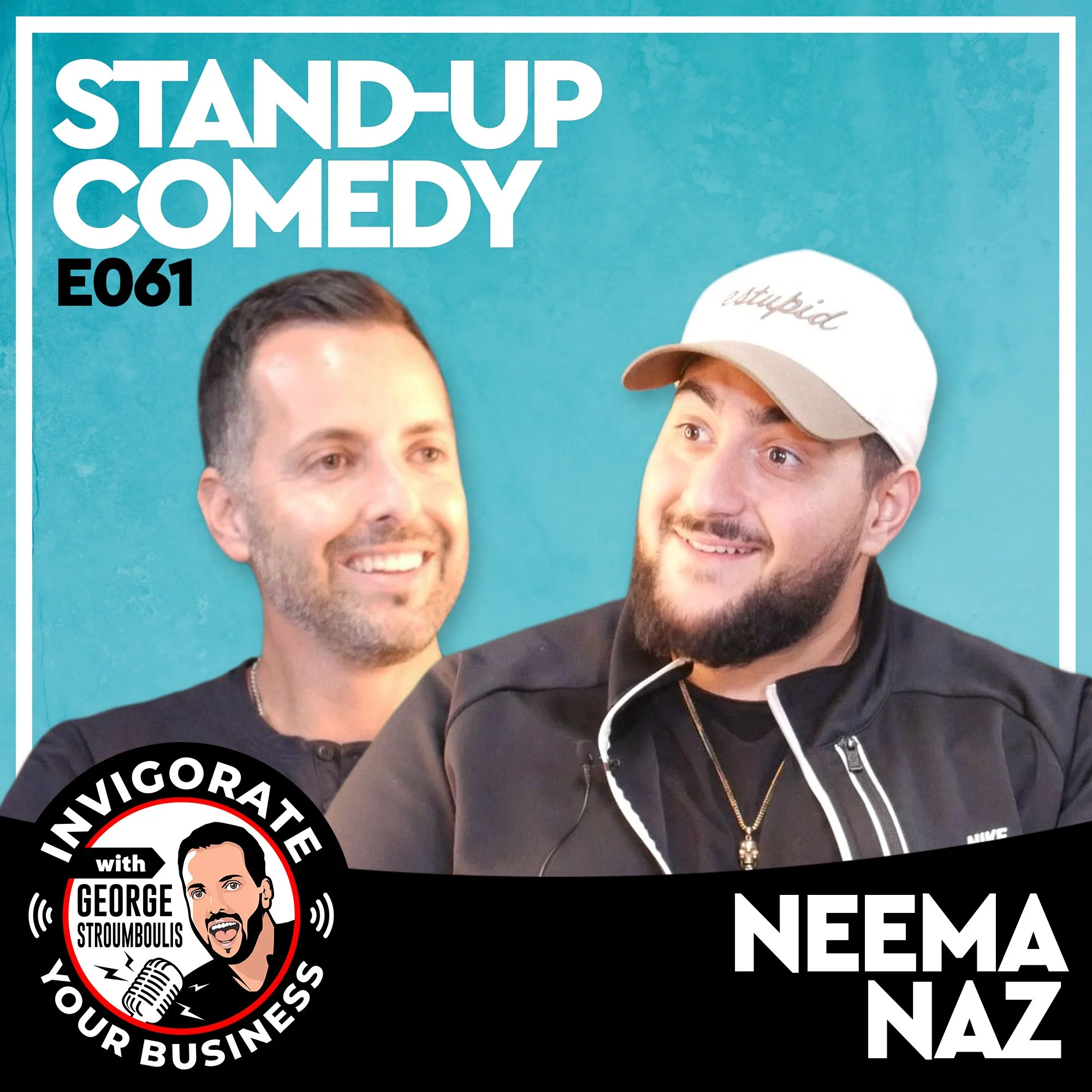
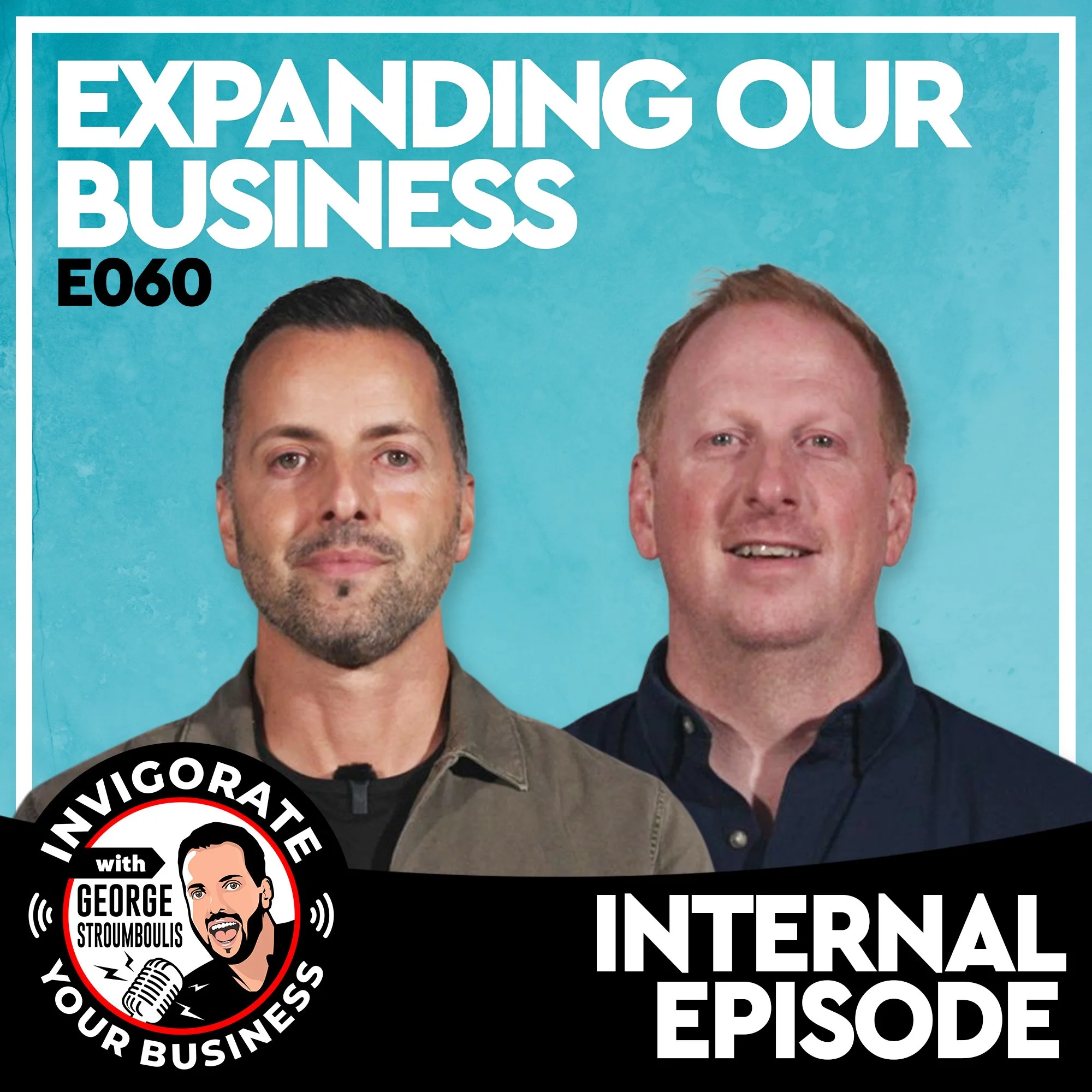
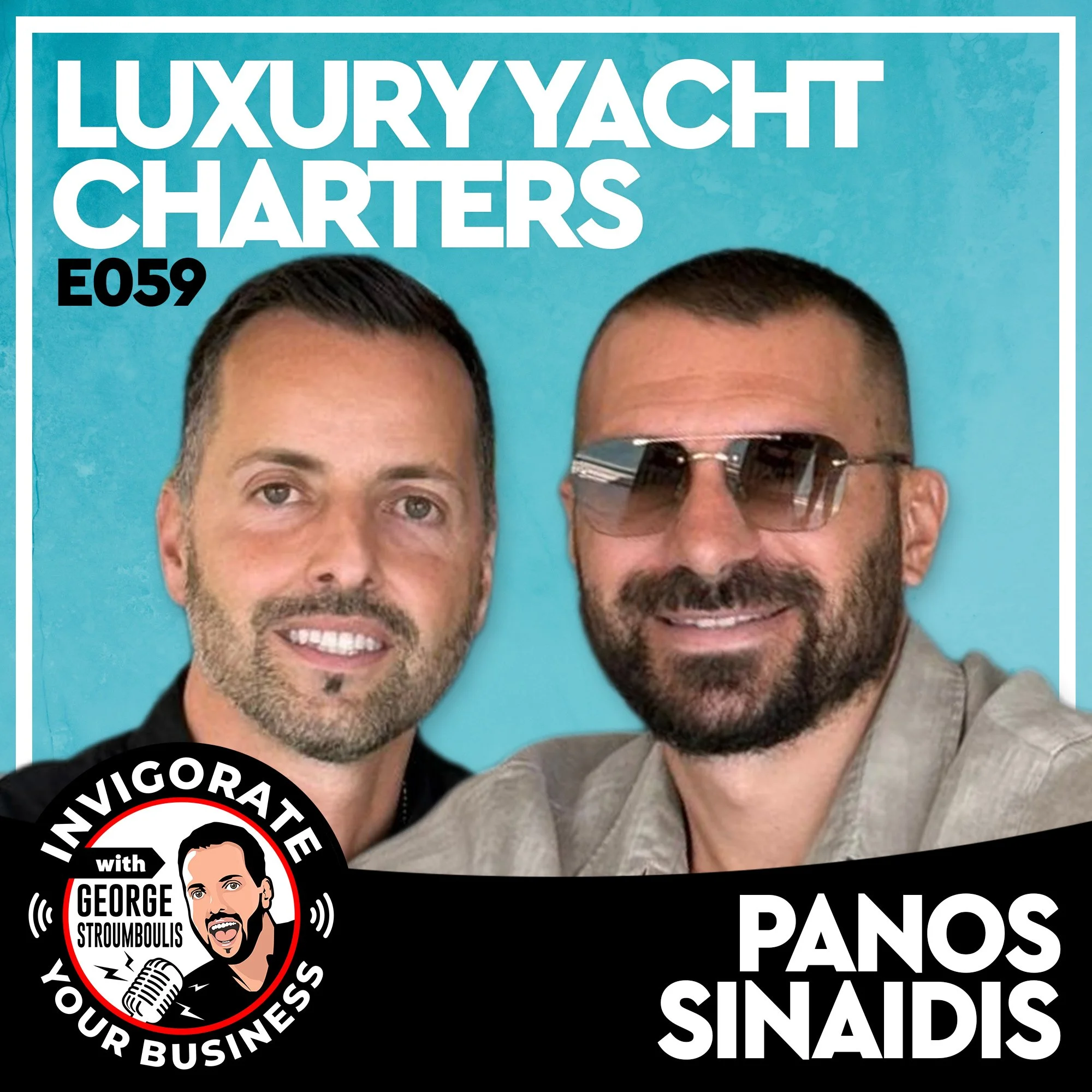
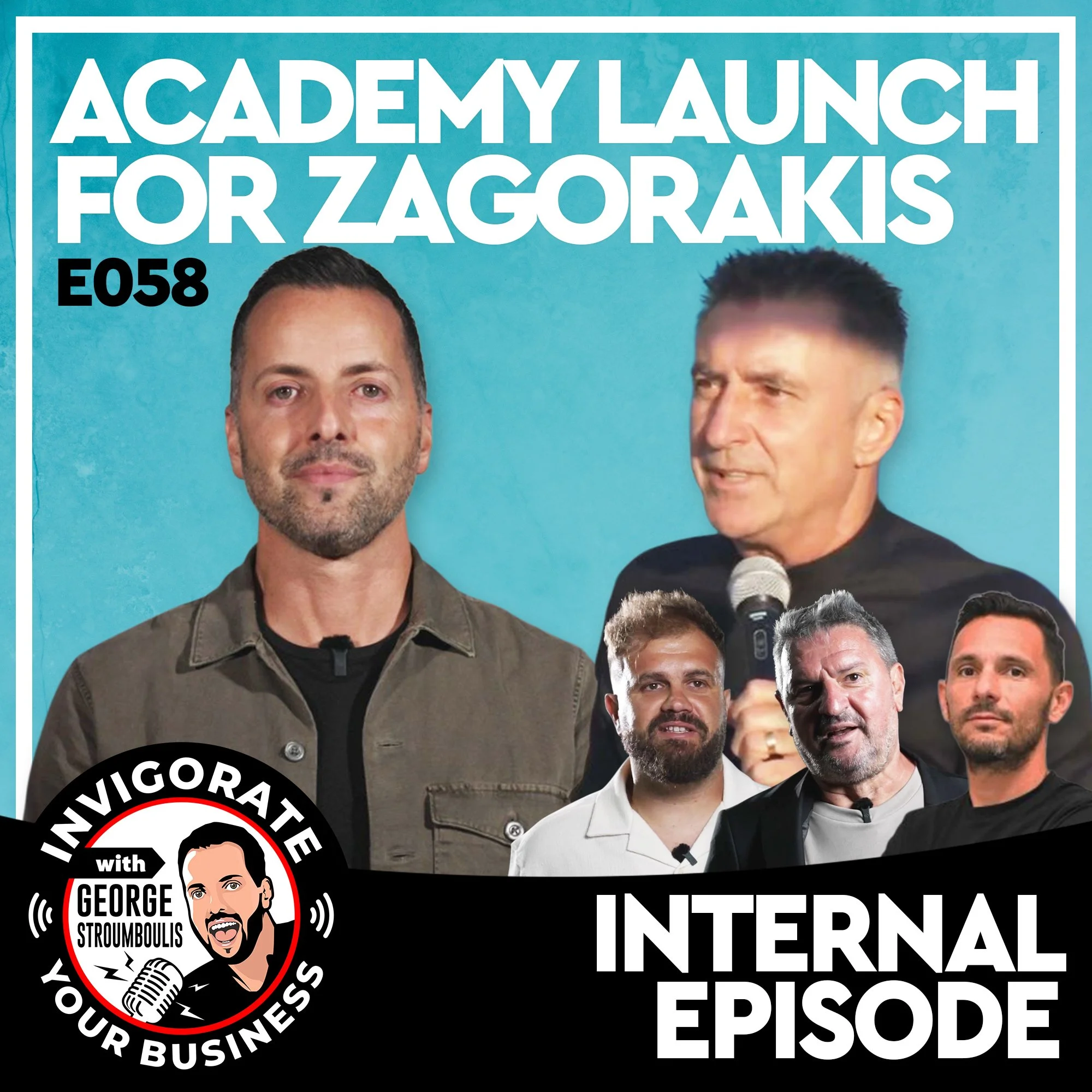
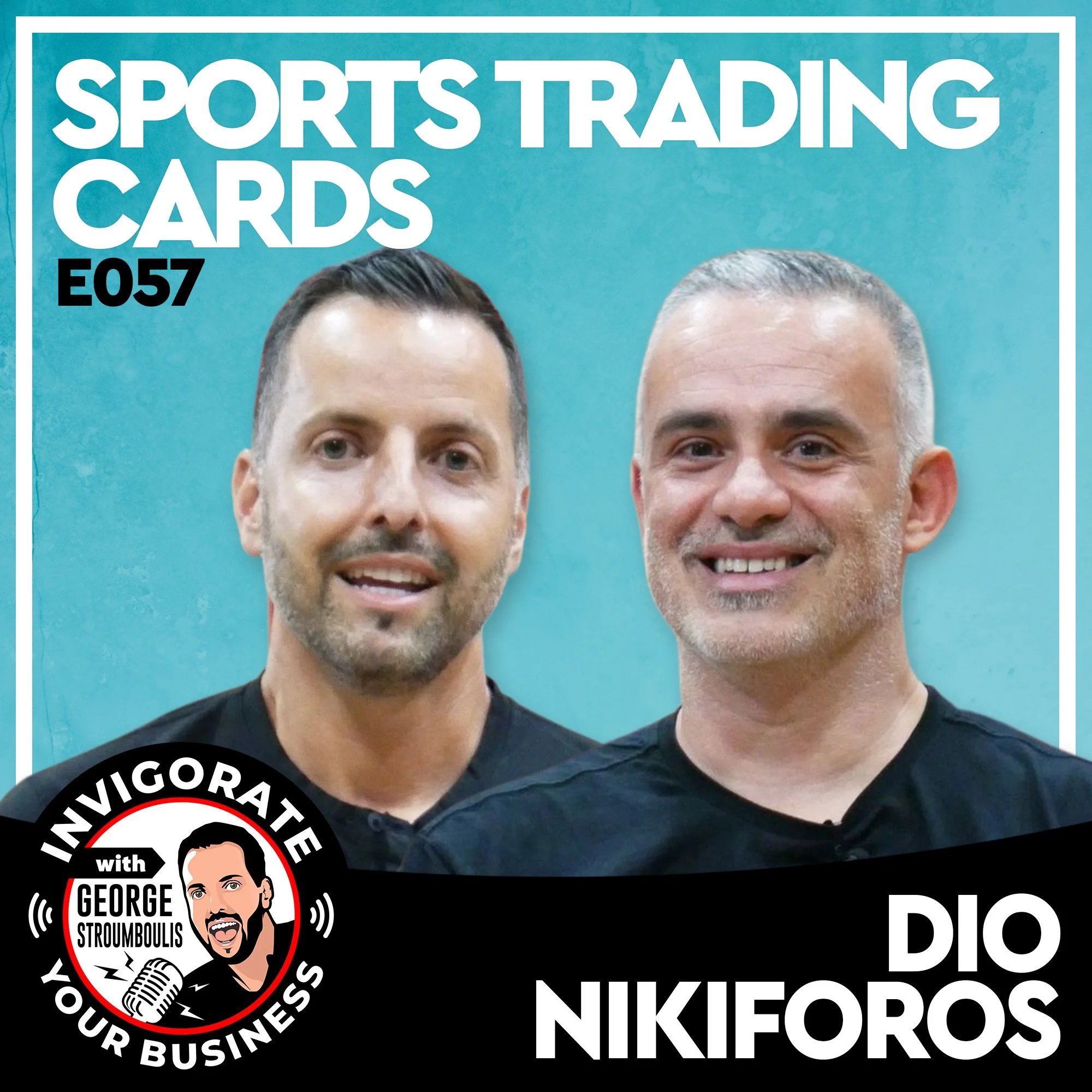


George Stroumboulis sits down with Judah Regenstreif in Newport Beach, California, for a powerhouse episode of Invigorate Your Business — diving into the world of lighting, product distribution, scaling companies, faith-driven leadership, strategic partnerships, corporate clients, family business, and so much more.